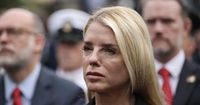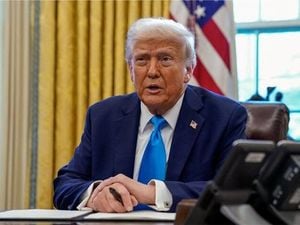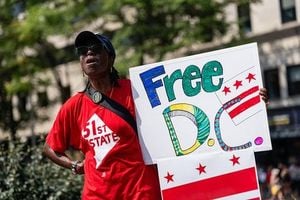In the wake of the shocking assassination of conservative activist Charlie Kirk on September 15, 2025, the United States has been plunged into a fierce debate over the boundaries of free speech, the appropriate response to political violence, and the use—and misuse—of governmental power. The tragedy has not only galvanized Kirk’s supporters, who now speak of him as a martyr for free speech, but also ignited a firestorm of controversy among conservatives themselves over how to respond to those who criticize or even celebrate Kirk’s death online.
According to Newsweek, former President Donald Trump wasted no time in framing Kirk’s murder as an attack on American values. Calling Kirk “a martyr for truth and freedom,” Trump urged the nation to “commit themselves to the American values for which Charlie Kirk lived and died: the values of free speech, citizenship, the rule of law, and the patriotic devotion and love of God.” Other prominent conservatives echoed this sentiment. Ben Shapiro, a leading right-wing commentator, labeled Kirk a “free speech martyr,” while Josh Hammer, senior editor-at-large at Newsweek, implored young conservatives to “double down like never before in our commitment to free speech and the civil exchange of ideas.”
Yet, as The Guardian reports, the aftermath has been anything but a simple reaffirmation of free speech principles. Instead, a growing movement within the right has turned its attention toward suppressing and punishing those whose speech they find offensive—particularly anyone who mocks or openly criticizes Kirk’s legacy. A website called “Expose Charlie’s Murderers” has sprung up, compiling social media posts from individuals celebrating or dismissing Kirk’s killing, with the explicit goal of getting them fired and publicly shamed. Conservative activists have started a “trophy case” on X (formerly Twitter) to highlight people who lost their jobs over such posts, with many of the targets being ordinary citizens rather than public figures.
The crackdown has even reached the media. According to The Guardian, MSNBC’s Matthew Dowd was fired after he remarked that “hateful words” can lead to “hateful actions.” A Florida reporter was suspended simply for texting a question about gun control to a member of Congress. The message from some Republican lawmakers has been even more explicit: Representative Clay Higgins pledged to use “Congressional authority and every influence with big tech platforms to mandate immediate ban for life of every post or commenter that belittled the assassination of Charlie Kirk.” He even suggested targeting businesses and revoking drivers’ licenses of those found guilty of such offenses. Congressman Randy Fine called on constituents to report government employees or licensed professionals who celebrate Kirk’s death, promising to demand their firing and revocation of licenses.
Vice President JD Vance, hosting the Charlie Kirk Show from the White House the day after the assassination, encouraged Americans to “call out—and, hell, call their employer” if they saw anyone celebrating Kirk’s murder. Stephen Miller, Trump’s longtime policy advisor, went further, pledging to “disrupt, dismantle, and destroy” left-wing organizations, which he described as part of a “domestic terror movement”—despite no evidence that Kirk’s killer was affiliated with any liberal group. The result, as The Guardian observes, is a conservative-led “cancellation machine,” wielding both public shaming and the threat of state power to silence dissent.
Ironically, this comes from the very movement that has long championed itself as the defender of free speech, especially when it comes to controversial or offensive ideas. As the debate intensifies, some conservatives are warning that the current approach is not only hypocritical but dangerous. Attorney General Pam Bondi, for example, has become a lightning rod for criticism after claiming on The Katie Miller Podcast that the First Amendment contains a “hate speech” exception and that the Justice Department would “absolutely” target hate speech in the wake of Kirk’s death. “There’s free speech, and then there’s hate speech, and there is no place, especially now, especially after what happened to Charlie in our society,” Bondi said. “We will absolutely target you, go after you, if you are targeting anyone with hate speech, anything, and that’s across the aisle.”
Bondi’s comments have provoked a fierce backlash from within the MAGA movement itself. As reported by The Daily Wire, conservative commentator Matt Walsh was quick to dismiss the notion of a hate speech exception, writing, “There obviously shouldn’t be any legal repercussions for ‘hate speech,’ which is not even a valid or coherent concept.” He added that while those who celebrate Kirk’s death should face social consequences, “We don’t need Pam Bondi swooping in to throw the entire conversation off the rails by completely missing our point.” Savannah Hernandez, a contributor to Turning Point USA, called Bondi’s sentiment “destructive,” demanding her removal as attorney general. Other right-wing voices, including Dave Rubin and Mike Cernovich, joined the chorus, with Cernovich tweeting that Bondi “really isn’t ready for this moment” and referencing her past mishandling of the Epstein case as further evidence.
Bondi, for her part, has doubled down. In a post on X, she clarified that “hate speech that crosses the line into threats of violence is NOT protected by the First Amendment. It’s a crime.” Citing federal statutes, she insisted, “You cannot call for someone’s murder. You cannot swat a Member of Congress. You cannot dox a conservative family and think it will be brushed off as ‘free speech.’ These acts are punishable crimes, and every single threat will be met with the full force of the law. Free speech protects ideas, debate, even dissent but it does NOT and will NEVER protect violence.” Bondi also argued that violent rhetoric is being used to silence conservatives and vowed, “We will never be silenced. Not for our families, not for our freedoms, and never for Charlie. His legacy will not be erased by fear or intimidation.”
The debate over where to draw the line between protected speech and criminal conduct is hardly new in American history, but the current moment feels particularly fraught. As Newsweek notes, Kirk himself had previously tweeted, “Hate speech does not exist legally in America. There’s ugly speech. There’s gross speech. There’s evil speech. And ALL of it is protected by the First Amendment. Keep America free.” That legacy now hangs in the balance, with factions on both sides of the political spectrum accusing each other of abandoning the very principles they claim to uphold.
Senator Chris Murphy, speaking on a podcast with Jon Lovett, argued that Democrats must stand up to what he called Trump’s impending crackdown on free speech. The question now is whether America can navigate this crisis without sacrificing the core freedoms that have long defined its democracy—or whether the legacy of Charlie Kirk will be used, paradoxically, to justify the very suppression of speech he championed.
The aftermath of Kirk’s assassination has become a litmus test for the nation’s commitment to free expression, exposing deep rifts not only between left and right but within the conservative movement itself. As the calls for retribution grow louder, the challenge for America will be to honor the Constitution’s promise that even the most offensive speech is protected, and that violence—no matter the target or the cause—remains beyond the pale.






